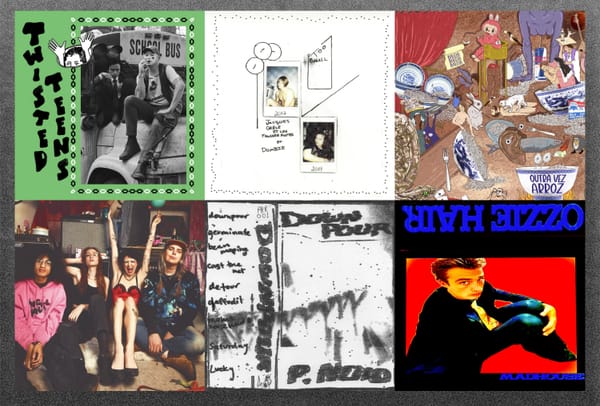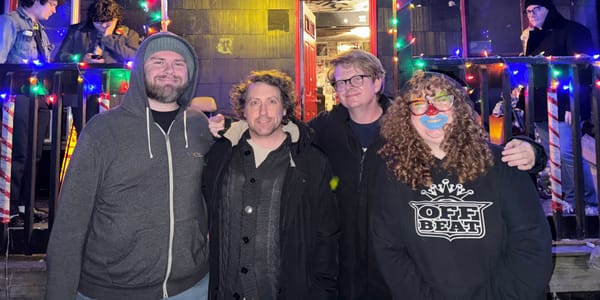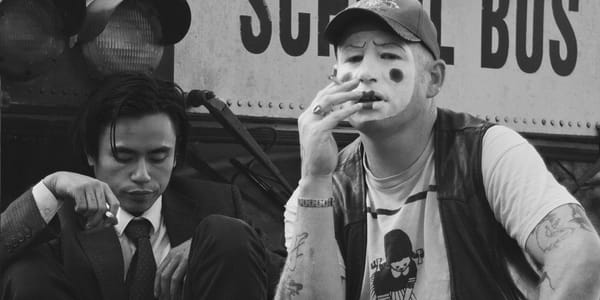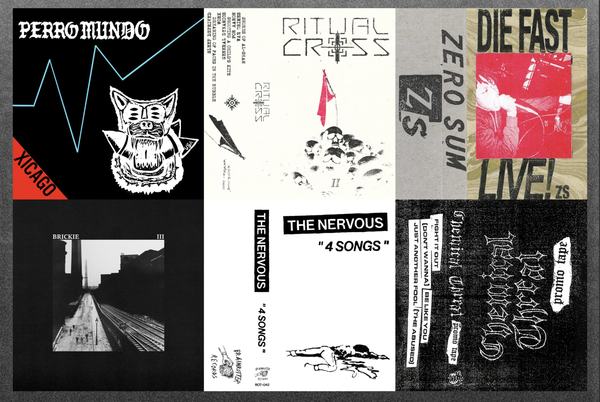baby tyler uncompromisingly pursues his dreams
For over a decade, Tyler Fassnacht has been putting out records and leaving it all on stage. With the release of his new album, he discusses what “success” looks like in punk.
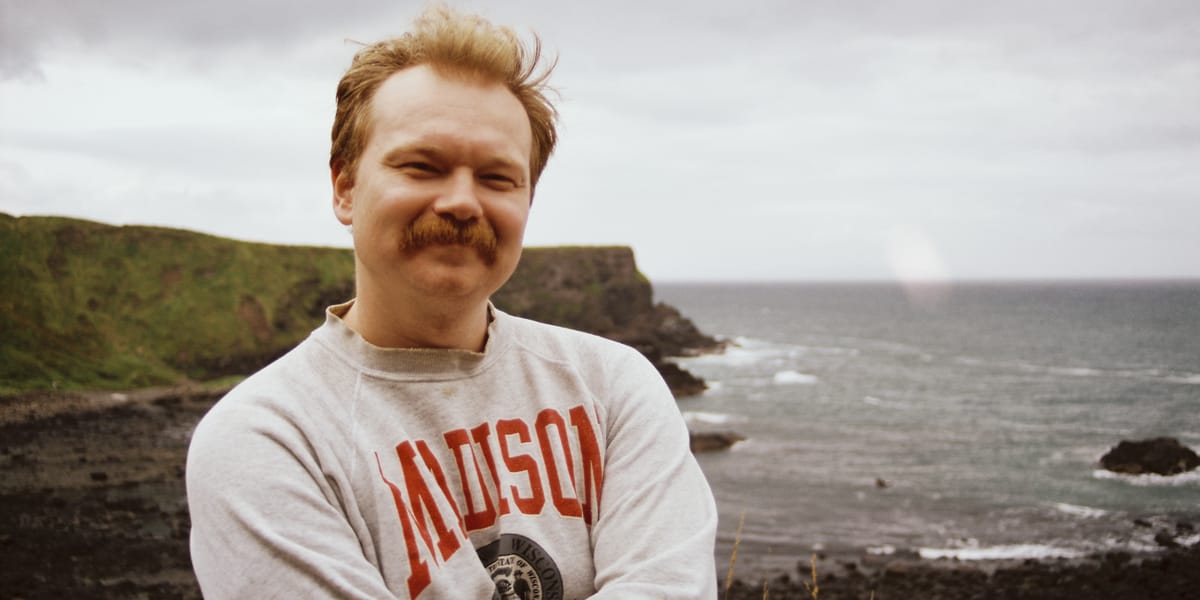
Sucker With A Dream, the fifth solo album from Baby Tyler, is the 36th (if I counted correctly) overall release Madison’s Tyler Fassnacht has been involved in across just 11 years. Between Fire Heads, the Hussy, TS Foss, Proud Parents, Celebrity Sighting, Heather the Jerk, and the titular Baby Tyler, Fassnacht has stayed busy making some of the best underground punk, indie, and folk music in the Midwest.
Fassnacht usually records the Baby Tyler records alone at home, a holdover from when the pandemic forced musicians inside and made them work with whatever they could cobble together. In Tyler’s case, that was a $9 drum machine app and guitars pushed to their maximum volume recorded directly into his laptop. Sucker With A Dream is a departure from this tried and true process–Fassnacht teamed with Madison-based utility player and engineer Graham Hunt (a one-time member of the full Baby Tyler Band) to create the highest fidelity Baby Tyler album yet. It’s also the last solo Baby Tyler album, which isn’t totally disappointing for those of us who heard 2024’s Baby Tyler Band album.
I sat down with Fassnacht in the middle of a hectic Gonerfest weekend, a seemingly rare moment where he’s just a fan and not on the grind. I wanted to chat with him not just about Sucker With A Dream—arguably his strongest dispatch as a solo artist—but about his entire life in the wild world of DIY music. One of the most consistent themes throughout the record is a look in the rearview mirror at the successes and disappointments of a decade-plus in the trenches, so we started from the beginning and charted a course through his lengthy discography.
Was Fire Heads your first band or just the first band of note?
Probably the first band of note. I had a band before that I started in high school with my best friend C [Nelson-Lifson], who I did Proud Parents with. Not that super serious of a band, but through that band, I would meet the people who would be in Fire Heads, and that was the first band of note that did serious touring.
How did Fire Heads actually get started?
It was me and this buddy Alex Ross. We started this blown-out punk project after we got obsessed with The Coachwhips. It expanded to a four piece lineup and we kept touring and recording.
Walk me through the timeline a little bit. Was Proud Parents concurrent with Fire Heads?
Fire Heads started in 2012 and Proud Parents started in 2014. Around that time, me and C started Proud Parents and we both were writing songs. That band started with our obsession with the Babies—the idea of two primary songwriters both singing their own songs and supporting the other person on their songs. We were hanging out with Heather [Sawyer] and got her to drum on it. She’s the best pop-rock songwriter in the Midwest, arguably, so she was just like “can I write songs too?” and we were like “of course!” That band was so much fun and so much easier [than Fire Heads] because I didn’t have to do the work myself. Everyone brought their own ideas to the table and we could bounce off each other.
If I’m considering your discography on the whole, Proud Parents leans more on the indie side of things rather than a straight up and down punk side of things. It coincided with the wave of indie/punk crossover stuff happening in the early ’10s. Were you influenced by that?
We all just loved pop and garage pop stuff—melodies and things that were a little janglier. For the first couple years of that band, I refused to use any overdrive or distortion on my guitar.
Were you just sick of it from Fire Heads?
Yeah, I was just like “it’s gonna be clean, the treble is gonna be high, and it’s gonna be brutal.” It sounded much better once I started using a Blues Driver [overdrive pedal].
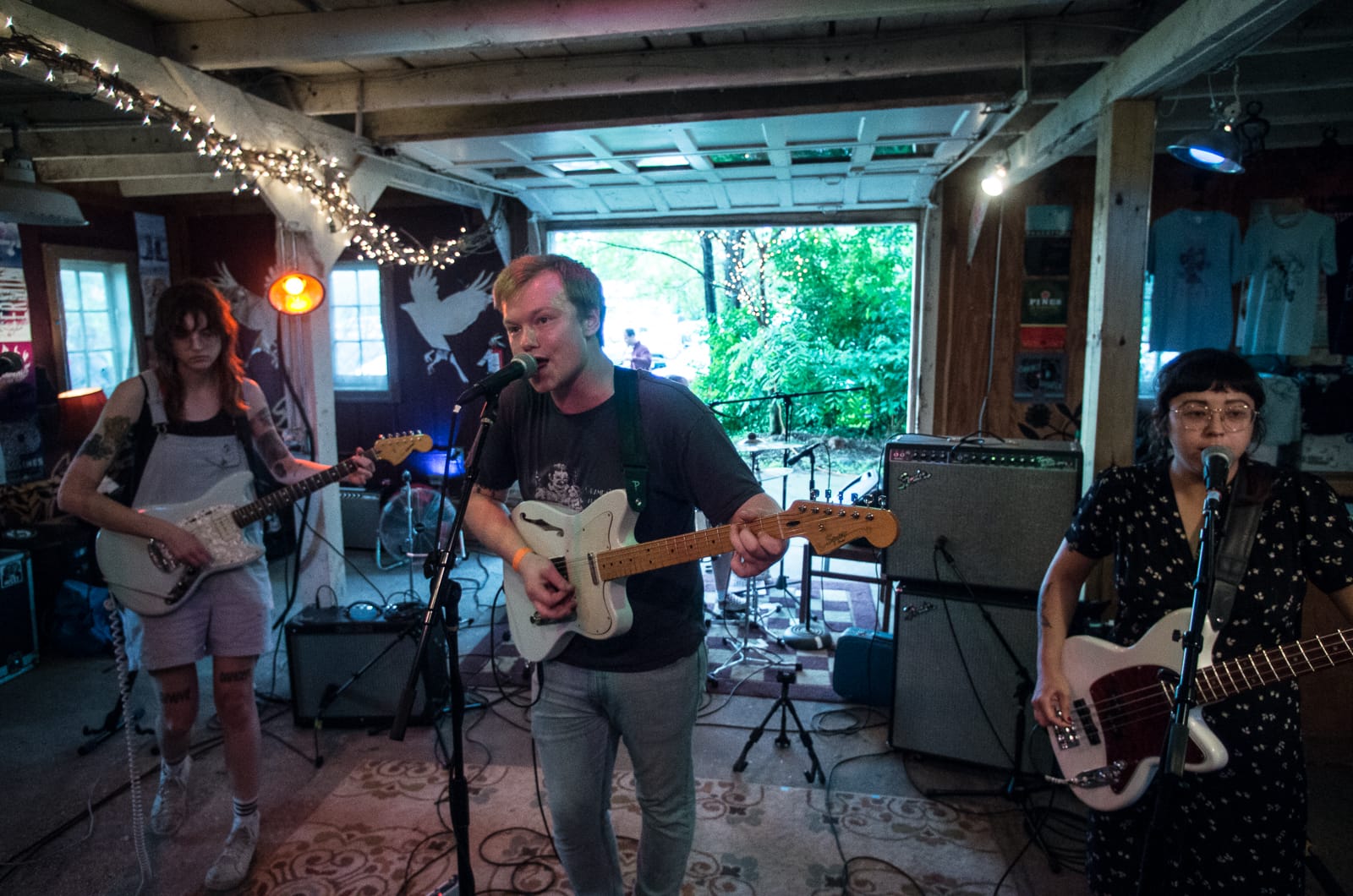
Proud Parents makes me think a lot about that quote from Martin from Soup Activists, where he implied that punks always want to start indie projects. Does that resonate with you?
For sure. A lot of punk artists who are making punk music just love music so much. You’re telling me all of these curmudgeons hate melody? No, they love it. Everyone wants candy every once in a while. Writing a great pop song feels so good. After a while, some punks start building up these ideas and side projects that maybe aren’t as tough or cool.
I feel like you’re the paragon of that to a certain degree.
[laughs] It’s true. It’s so funny, one of the first solo TS Foss tours I went on was really hard for me to book because I only had punk connections. I was hitting up all these punks and being like “I have this twangy, solo folk thing and I’m trying to play living rooms. Do you know anyone who can help out?” So many people were like, “I’ve got a couple songs I’ve been working on acoustic. Maybe I could play on the show too.” It’s like, oh, you’ve also been secretly wanting to make songs on your acoustic guitar but you haven’t had the opportunity or confidence to whip it out.
Do you think it’s because people are scared?
I think so. I was scared.
When did TS Foss actually start?
I think I started messing around with it in 2014. The beginning of the project was concurrent with Fire Heads and Proud Parents. I used to work at the Madison’s Children Museum. I was designing educational programming to happen in the exhibit spaces. We had an old 1800s log cabin that had been restored and moved onto the premises. It was an exhibit on what pioneer life was like. Me and a coworker who could play banjo started this program where we were playing old traditional folk songs in it for kids. I started getting more interested in the idea of finger picking patterns.
At the time, I was playing a lot of punk guitar. This was just a new fun thing to work on—a new skill that I wasn’t very good at, but I could sense myself getting better. Finger picking patterns are very meditative. I started writing lyrics that were a little more emotive and a little more serious than something that would end up in Fire Heads or Proud Parents. I think I was more into the lyrical aspect than just putting together something that would fit over barre chords–having a more structured narrative that was maybe a little more poetic and a little more sincere and just being able to fit that over patterns.
Which in turn probably makes that feel a lot more vulnerable, right?
Yes.
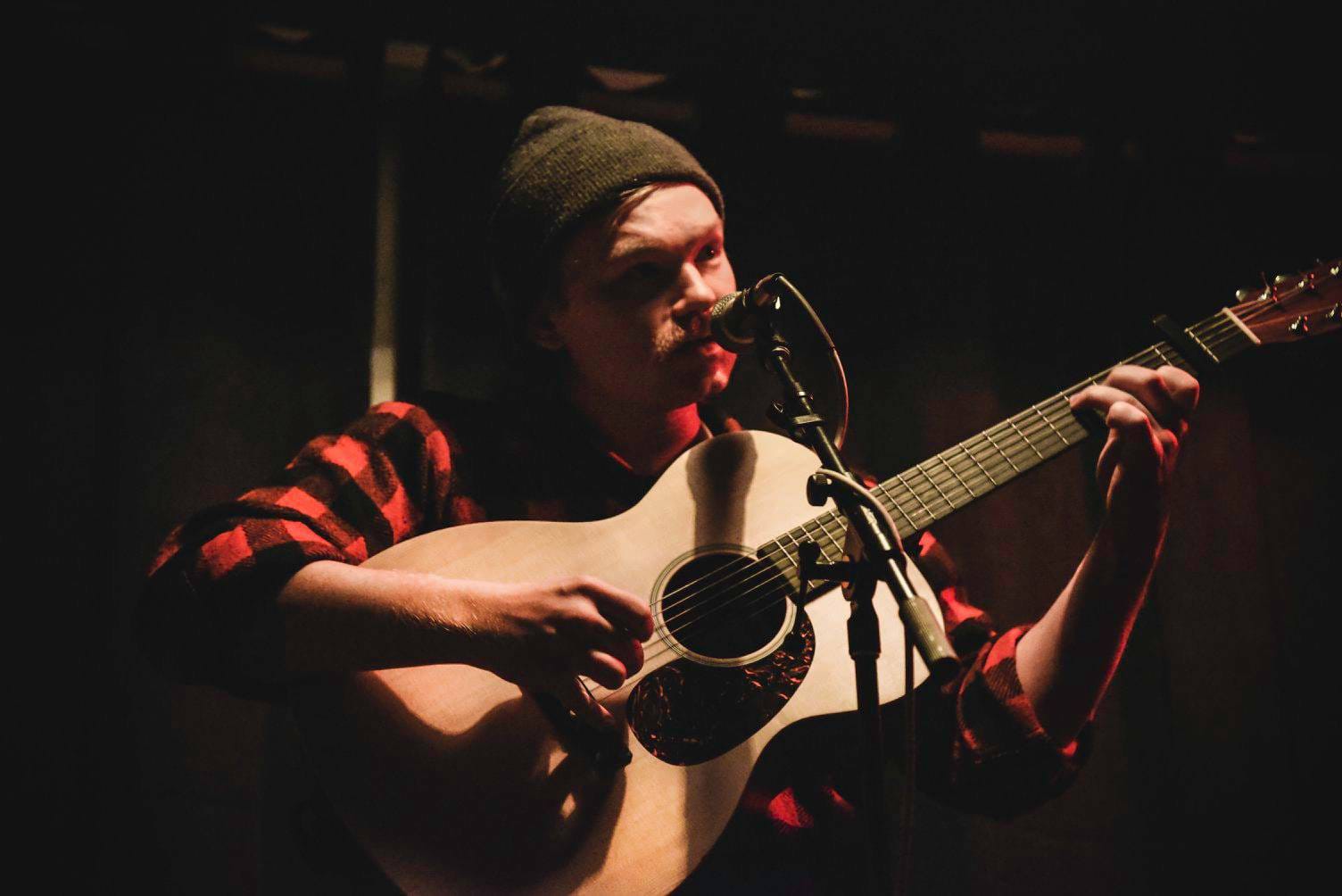
Proud Parents had some humor to it, which created some distance between you and the subject.
If there’s a funny punchline, it’s OK to write a song about being depressed. Everyone’s like, “Haha, yeah, same!” But if it’s just a really sad song about some shit your parents did to you when you were a child, it’s like, “Are you okay?”
You met Bobby Hussy through Fire Heads. How do you get involved with the Hussy? The Hussy existed for many years before you joined the band.
They had a full, healthy career before I got involved. They toured Europe twice, they toured America many times over, and they released records with really great labels. It was at a time where the Hussy was not necessarily taking a break, but they had done it so hard for so long that they were starting to ease up a little bit on it.
I was doing so much with Bobby in Fire Heads and with Heather in Proud Parents that I was just with both of them all the time. I think they needed a changeup, a slight variation to get excited [about the band] again. They had done a couple of shows where a third person would come up and play for a couple of songs, so they talked about bringing me into the band more fully. By the tour for the last record, we had a fourth member who was playing bass. Tyler Spatz was the bass player who came in.
Is that why you’re Baby Tyler? Because there were two Tylers?
Yes. Heather got a hold of this story. I was maybe 3 or 4 or something. My parents always called me Baby Tyler when I was a kid growing up. I think my mom was introducing me to some of her coworkers because they came over for dinner. She introduced me as Tyler and I very strongly corrected her: “Mommy, my name is Baby Tyler.”
It’s fun that that’s stuck with you as an adult.
Without the mustache, I do have a baby face. When I was starting to do the solo project during the pandemic, I didn’t have a name for it. I was releasing this album that I had written and recorded in a day or two. FDH Records had reached out and they were doing this limited series vinyl subscription series. They wanted to release Dumb Masheens. They were like “what do you want to call it?” and I was like [sighs].
Do you feel like you’re stuck with it now?
Absolutely.
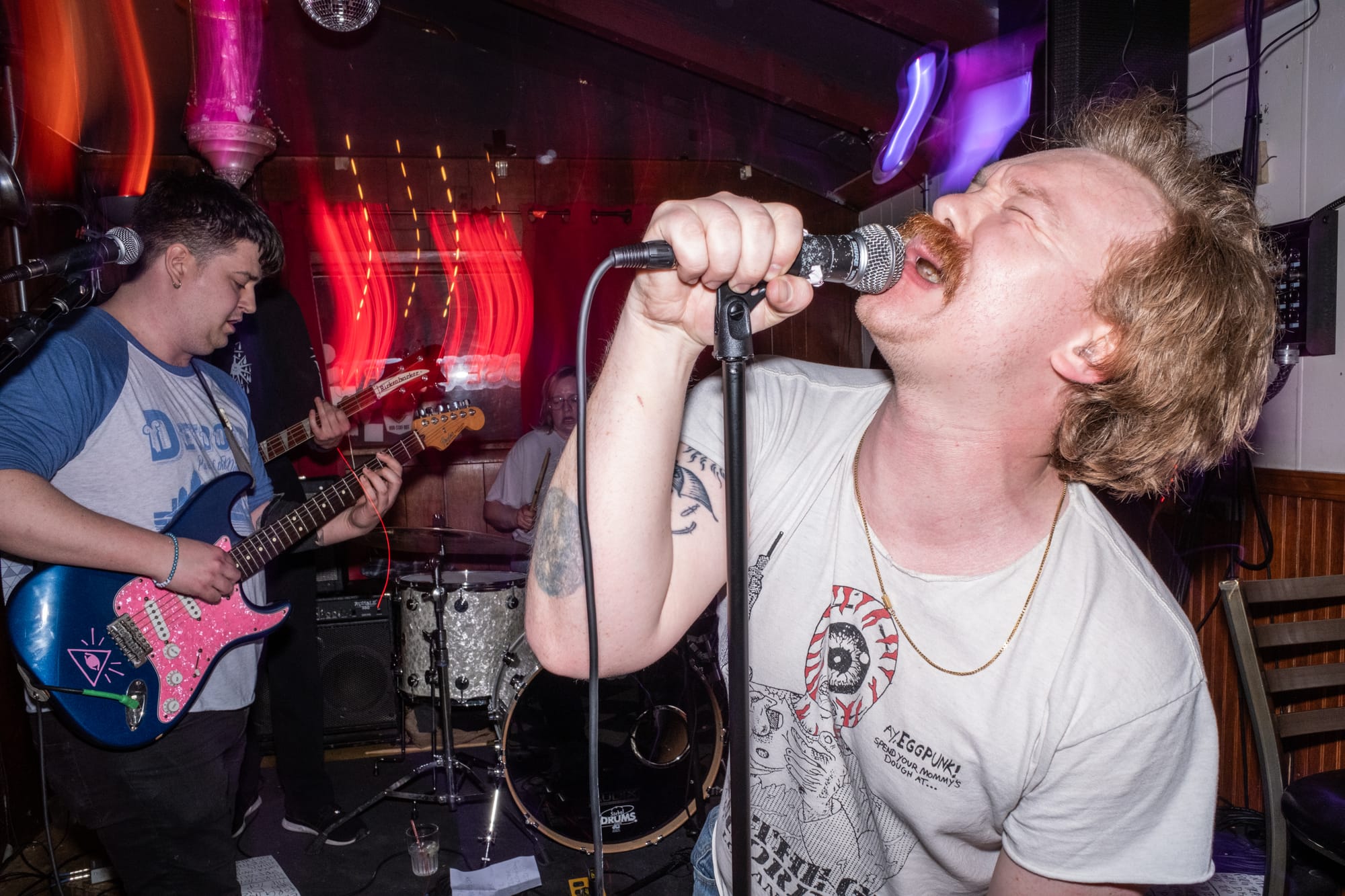
How did Baby Tyler, as a solo project, actually start? Was it out of pandemic-era boredom?
Every punk found a drum machine during that time and was like, “wait, I’ve got an idea!” It was really fun and I didn’t think anyone would really care about it, so I put it up on Bandcamp for free and posted about it online. People loved it. It’s frustrating—it’s one of those things where you put such little effort into a thing and everyone cares about it versus something else where you put in an insane amount of effort and no one cares at all. We were really pushing Fire Heads hard, I did so much on the last thing we did [the split with Sex Scenes] and people were like, “Yeah, it’s good.” [Drumb Masheens] I wrote and recorded in two days.
How did you settle on the sound for it? Was it just what you could cobble together at home on your laptop?
I had very little knowledge of how to record in that way. I found a drum machine app that a friend had recommended: the DM1. I believe it’s $9. I just use that for everything. I DI’d guitars and bass through pedals. No EQing at all because I didn’t really think about it. Everything is super in the red. I went out to our practice space and screamed over the top of it.
I kinda got roped into this podcast [155 Pod] that talked about punk songs, so that gave me a good reason to have my recording gear out. Every week, they would announce what song they were doing and they took fan submissions for covers. I submitted a cover every week for a whole year. I was learning more about mixing and EQing and adding other things to it. I was getting better with vocal harmonies. I just started writing more songs on my own, so VOL. 2 came out really fast.
How’d you figure out the live setup?
John [Toohill] from Science Man did a similar thing, so I called him and was like “I wanna do what you do. What do I need?” He was like “you can reroute each instrument to a different amp. It’s a pain in the ass, but it’s worth it. It sounds way better than all through a PA.” We would get on FaceTime and he would hold my hand and walk me through it. I had all these plans to play shows solo, but then I got an email from the booking agent of Kikagaku Moyo. They were like, “Hey, they’re coming to the U.S. to do their final tour before breaking up. They want Baby Tyler to open in Madison.” I thought it was a scam [laughs]. Like, What? They’re playing an 800 person theater. Baby Tyler Band isn’t real!
Was that your first show?
First ever show! I hesitantly responded and was asking these professional-seeming questions to get a response and make sure it wasn’t fake or a joke. I was like, OK, I just agreed to play this show in this huge theater opening up for this incredible band. I don’t want to do this solo. I put together the first iteration that was Gwen [Beltane], Liam [Casey], Heather, and Graham. It was a sold out show. That was very overwhelming. As soon as we finished that show, I started doing solo touring. Nobody else could go on tour.
The Baby Tyler Band album was recorded right before that show, right?
That album was a rehearsal for the show.
I was wondering about that. It says “recorded live” on the jacket, and it sounds very “on stage,” but there’s no audience sound.
We needed a space that was big enough for that band to rehearse, and we were only going to get two days of rehearsal. Everyone is such a musician, so I wasn’t super worried about it. I had a friend who worked at a professional music studio with a huge sound stage. He was like, “What if we just mic’d everything?” We had a 14-song set, because we had to play for 40 minutes or something. We played the set three times, so by the end of it, my voice was so hoarse and blown out. That was the first time that we, as a band, had successfully played through the songs, and it was the day before the show. Years later, he was like, “You know, I still have those recordings. They sound pretty good.” So we just mixed them down and it was for sure good enough to release.
Do you like touring solo?
I love touring solo. It’s way more work, and it’s exhausting, but, man, that payday really hits when you don’t have to split it five ways. Almost everyone has a comfy couch, has a guest room, or is willing to feed one person. It really developed a stronger sense of community for me in the DIY scene. It’s so much easier to take care of a single person, so I felt a lot of support and appreciation touring around.
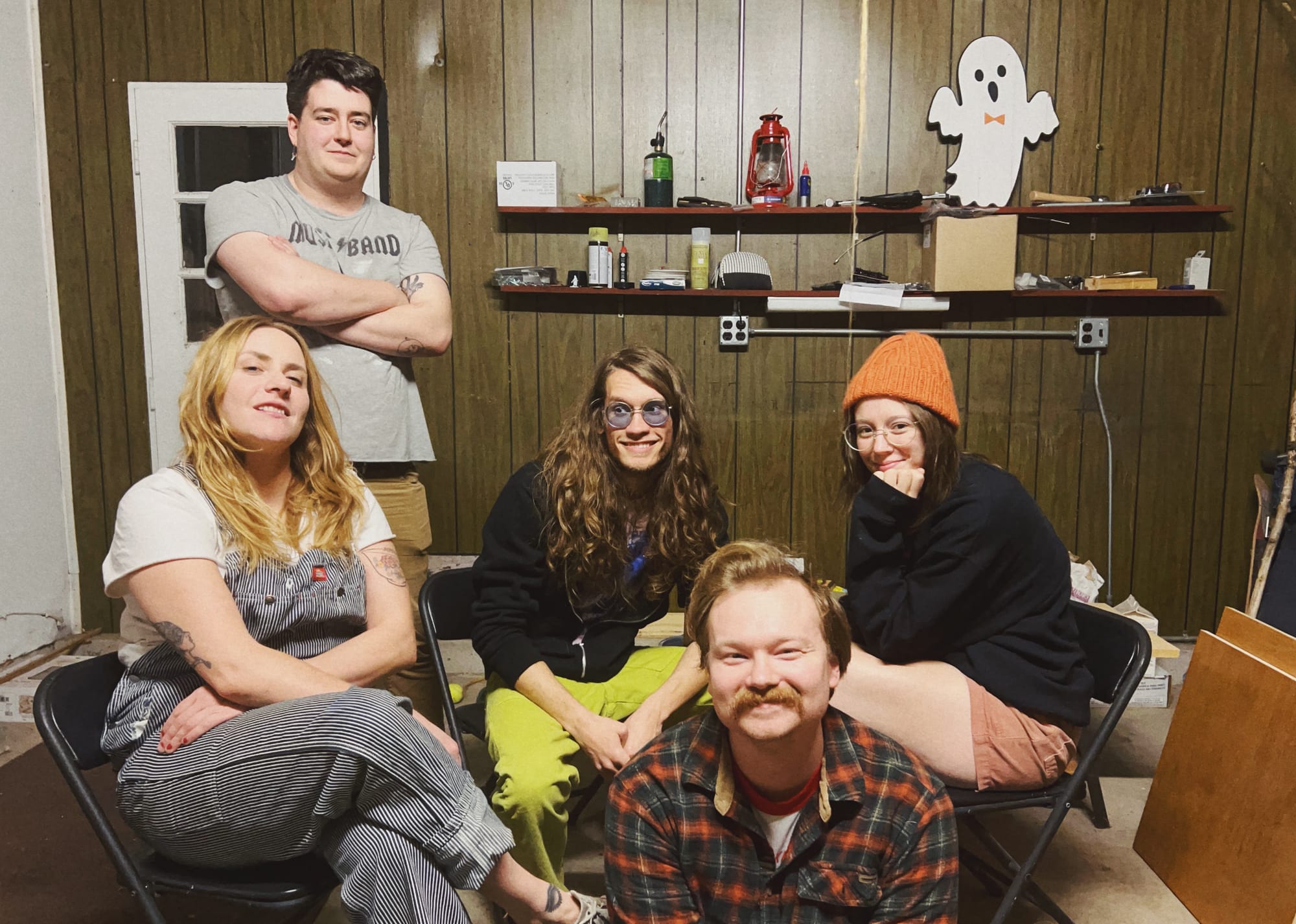
How did Celebrity Sighting come about?
Me and Danielle [Tucci, Tyler’s longtime partner] had always joked about starting a band. She’s been around live DIY music for her entire adult life. When we started dating, she was super supportive of me and was always very understanding when I’d go on tour. There were times where I was like “there’s this good show opportunity but it’s literally on our anniversary” and she’d be like “that’s fine, you can play the show.” She knew how much it meant to me, but it was always this thing that I could tell she wished she could be more a part of it.
I was living for two months in a friend’s spare bedroom between leases and I was writing music the whole time because I had nothing else to do. I was working on these songs that were Proud Parents-esque, but I was pushing them more into rockin’ stuff. I was putting the drum machine on it, but I realized none of it could be Baby Tyler stuff. It was way too poppy. I started writing all these songs based on Danielle’s experiences. She had a year plus long medical experience where she had to deal with all of these insurance loopholes and she was getting screwed left and right. She was working somewhere for a decade and got laid off by her own brother. She had a real tough two years.
Did she think they were accurate?
Oh, 100%. She was like, “How did you do this?” Well, we’ve been together for a decade. We talk all the time. [laughs]. I brought it to her as an almost finished product. I had recorded some vocal parts and, originally, I was going to have her sing them and then I would remove my parts. But then it was like, what if we do a Times New Viking thing where we both sing all the parts at the same time? Sometimes we’re harmonizing, sometimes we’re just shouting in unison. I think that helped her too, because she was really nervous. The attention was on both of us. She had so much fun recording it, and I think the tape turned out so well. She was like, “Well, we have to play a show.” I was like, “Yeah, we’ll make a small run of tapes, put a live band together, and play one show. It’ll be a fun, small thing!”
This is a common thing in your life. “I’ll do one, it’ll be lowkey” and then five years later, here we are.
[laughs] We put it out and we got a Stereogum writeup. All these people started asking us for shows before we even played the first show. Danielle has been having the best time. Now it’s a full, serious band.
I feel like between TS Foss and Baby Tyler, the two projects written from your perspective, lyrically, there’s a little bit of not doing OK.
[laughs]
I know you to be an affable person. The Baby Tyler on record is very angry and serious. I think TS Foss is a little sad and serious. How would you define yourself emotionally?
Right now in my life, I’m very happy and satisfied with how things are. That has not always been the case. Growing up, I was in a very emotionally heavy household. I didn’t really have the ability to express that, necessarily. I grew up thinking it doesn’t matter if you’re not feeling good, you still have to do shit and move forward—that doesn’t have to define who you are every day. I was on antidepressants through college and I’ve been on and off seeing therapists.
I know that there are more deep-seated issues that I have dealt with successfully and unsuccessfully over the years, but when you start being in a punk band in your late teens and you do that for a long time, it really arrests your ability to process in a lot of ways. Especially if you do it the way I did it, with a lot of partying and being on the road and a lot of being like “this is a real life problem and it’s not real life and I’m on tour.”
You can kind of become a different person than you are in real life.
A lot of those songs would be written out of a point where I was very upset and sad about something. I would write something about that. I might not be feeling like that the next day. I don’t consider myself a super angry, depressive person all the time. Right now, especially, everything in my life is going great. Things are really coming up Milhouse [laughs]. When your life is going great, you start feeling bad because so much other shit is not going great. There’s so much other stuff to be legitimately upset about. I do have a tendency to focus very much inward, so the happier I get the more I’m like “...oh.”
A lot of the Baby Tyler songs deal with success and disappointment. There’s a lot of that on Sucker With A Dream, but even on Imposter there’s “Generational Disappointment.” How do you define success and disappointment?
The marker for that changes a lot. There are times where I have an idea of what success would look like. At a certain point I’m either acknowledging that that’s an unrealistic expectation, or I’m arriving at that point and realizing that that’s no longer what I define as success. I’m 33. I’ve been touring pretty seriously since I was 20. I’ve put off a lot of professional opportunities, a lot of relationships and friendships have faltered because of it, and I’ve spent a lot of time and money on a lot of time not making money in order to do this and keep moving it forward.
As I was writing this record, two years ago, I was not at this positive of a point. I was not seeing myself as very successful, and I felt not only the anger that goes along with that, but I also felt the self-reflection of being like, Who am I to expect all of this for someone making punk music? Why do I feel like I’m owed anything? No one’s telling me to do this.
That happens across all of your records, but especially Sucker With A Dream. There’s a little bit of being mad at the music industry on this one, and what you actually get out of the effort you put in as a DIY musician.
It’s a ponzi scheme. No one’s making money for themselves. Someone’s making money, but it’s not you. There’s the streaming stuff, and the AI stuff, and every band I know is looking for a new van. Cars are too expensive. No one can afford hotels. As a punk DIY person, people are always like, “Oh, that’s so lame, you need a hotel every night?” Maybe not every night, but you’re supposed to go on the road for three weeks and sleep on a floor every night? When you’re in your 30s, that’s hard. My back hurts all the time. I have to consistently exercise and stretch to perform at a level that I feel like people deserve to see.
You are a fucking wild person on stage. That comes from making sure people feel like they got their money’s worth?
I’m very hard on myself in terms of what I bring to the table. If it’s not the absolute best that I’m able to [perform], I feel like I don’t deserve [the audience’s money]. If I’m not about to throw up and I’m exhausted and sweaty, like I literally physically can’t give you more, I’m not satisfied.
I feel like this new record too is the best representation of the live solo Baby Tyler experience on record. Was that something Graham brought to the table? This is the first record you’ve had someone besides yourself credited.
I wanted this record to sound different and bigger. I recorded all the tracks, initially, the same way I’ve done the other ones. At that point, [usually], I would try to EQ things, add synths and keyboards here and there. He was like, “Dude, let’s re-amp everything. We can make it sound [live] in the room.” We would—very friendly, not aggressively—butt heads in the studio a little bit. I was like, “Oh, it needs to be more blown out. It needs to be more lo-fi and shitty.” And he was like, “No, it shouldn’t. It should be cleaner.” He really pulled me out of my comfort zone. I was able to make him compromise on some stuff he wanted, but there were times where he was like, “I literally refuse to pull these vocals down anymore than I have already.”
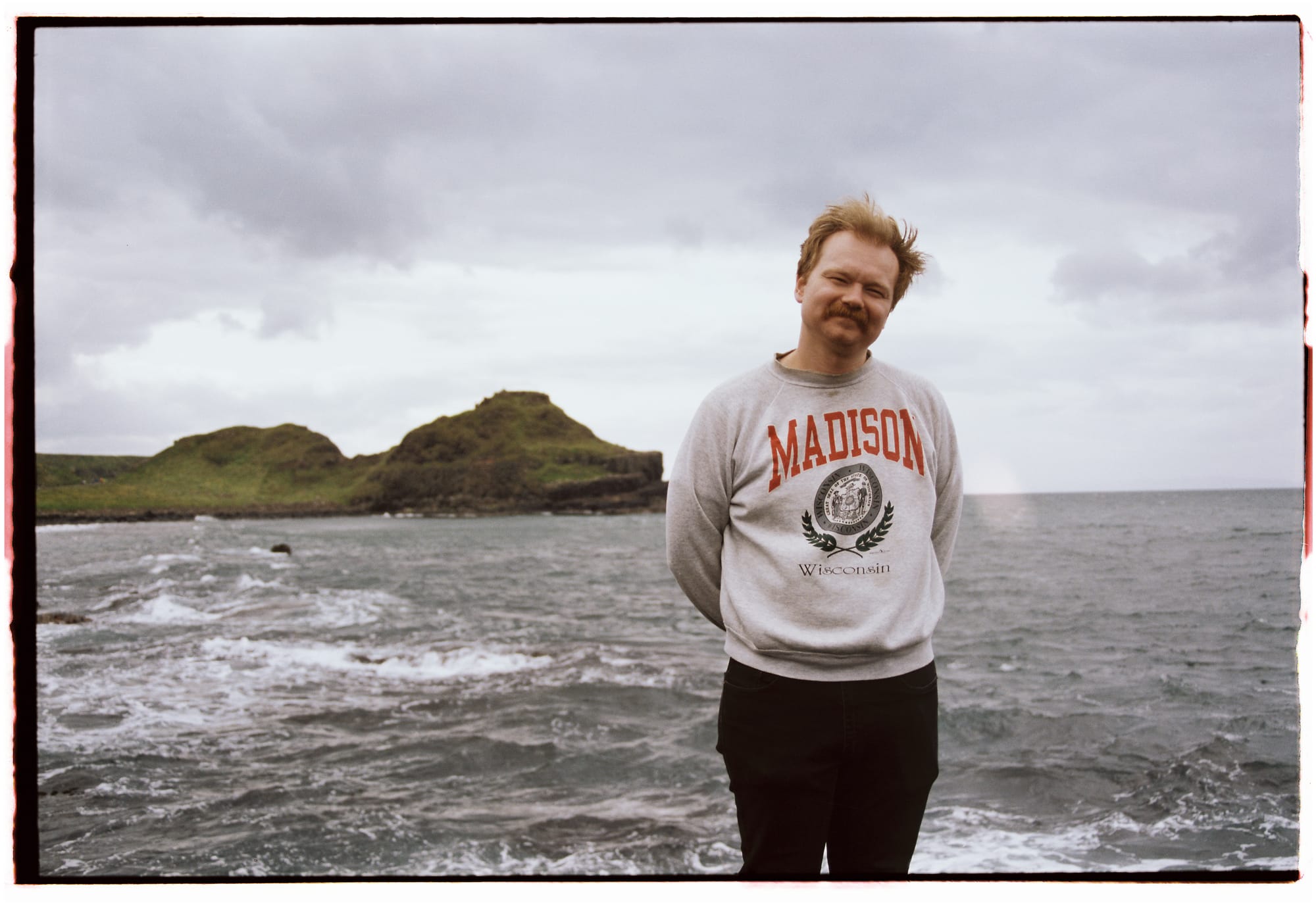
It’s definitely the most I’ve been able to hear you on one of these records. I was going through the evolution of all of them through the new one, and you’re slowly popping out more in the mix each time.
It’s really scary. I was very nervous about it when we got the finished product. I was like, Man, people are going to hate this [laughs]. I feel like it’s the most minimal recording I’ve done. I’m not layering a bunch of stuff to obscure myself. I think it’s very much “next step” material.
That’s how I felt listening to it.
There’s songs on the record about doing the same things over and over again and expecting something different and how dumb that is, and [about] old punks and garage heads being like, “The industry these days! No one cares anymore!”
Is that what “Old Advice” is about?
Yeah. It’s just like, no dude, you haven’t done anything new or interesting in years. Read a book or listen to the radio. I’ve always been very afraid of doing the same thing over and over again. Doing that is comforting. I’m really good at this thing, I could just do it over and over again. People really like it.
But then how do you hit the next level?
It’s not gonna happen. You’re gonna stay plateaued and people will start losing interest. This album was me being like: You know what? Fuck it. If you have an idea that makes me uncomfortable, let’s explore that.
see/saw is a reader-supported publication. If you enjoyed this article, please share it and subscribe to this newsletter.

